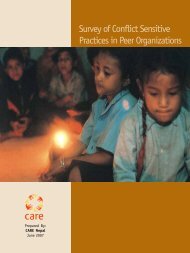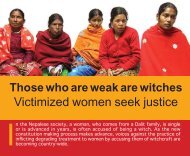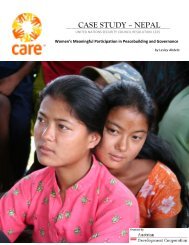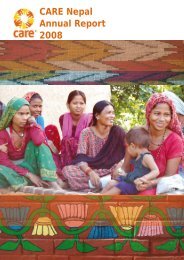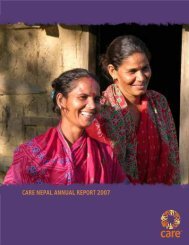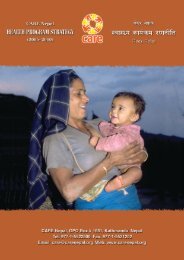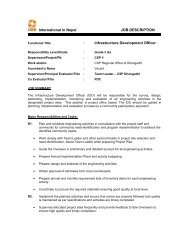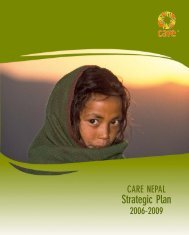Untitled - Care Nepal
Untitled - Care Nepal
Untitled - Care Nepal
You also want an ePaper? Increase the reach of your titles
YUMPU automatically turns print PDFs into web optimized ePapers that Google loves.
India as their houses are near to the boarder<br />
also. “There is neither education nor development.<br />
There is little land but we have no proof that we<br />
own that. We do not have lal purja (land<br />
certificate) of it. We work very hard but not that<br />
much is earned. From land, we survive for 6<br />
months and for next 6 months we have<br />
to work for others in village”.<br />
“We do not have land to survive our family. There<br />
is not a single water tap in our community; we<br />
have to even buy the water. You tell us, should<br />
we buy food or water from this<br />
amount of earning”.<br />
(FGD with land less women in Mohattari)<br />
PROTECTIVE FACTORS<br />
Coping and resources<br />
We identified a number of different coping<br />
strategies. The coping mechanisms may be<br />
divided into three categories: 1) individual<br />
coping (i.e. self-initiated strategies to solve<br />
a problem situation, 2) family support (i.e.<br />
support or cooperation to solve a problem<br />
by family members), and 3) community<br />
support (i.e. support and cooperation from<br />
neighbors, elders and other community<br />
members to solve a problem situation).<br />
Many psychosocial problems occurred due<br />
to social issues such as being ignored by<br />
family members, separation from family<br />
members and being physically disabled.<br />
Both positive and negative ideas for coping,<br />
as well as community support and<br />
difficulties were identified.<br />
It was found that most of the women first<br />
relied on family members while<br />
experiencing problems. The family<br />
environment was found to be both a source<br />
of support as well as a place that lead to<br />
increased distress. Some of them said they<br />
shared the problems with their family<br />
members especially with sons and<br />
daughters. Many also shared with close<br />
friends. A few of the respondents reported<br />
the use of alcohol to relieve their problems.<br />
Economically, women who had suffered<br />
from their in-laws and husband found<br />
support from their parent’s homes.<br />
Furthermore, women were supported by<br />
their own children. Children helped the<br />
mothers to do household work and spent<br />
more time than before. On the other hand<br />
some of the women were beaten by their<br />
husbands, and were suspected of having<br />
relationships with other men, this blame<br />
towards the women increased their<br />
psychosocial problems.<br />
Socially, women were supported by some<br />
organizations and emotionally by their close<br />
friends. It was mentioned that women<br />
generally shared their problems while<br />
working in the fields with close friends.<br />
Like this, they received emotional support<br />
which eased their minds. Women whose<br />
husbands were not at home were often<br />
criticized by community people and prey<br />
to men wanting to take sexual advantage of<br />
them, affecting their trust in others. Many<br />
women have used women’s groups and<br />
saving & credit groups as supportive<br />
foundations because they have received<br />
emotional and financial support from these<br />
institutions.<br />
Psychosocial Issues of<br />
Women affected by conflict<br />
23



